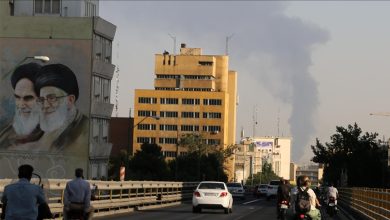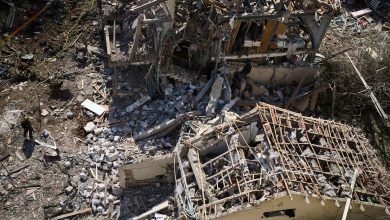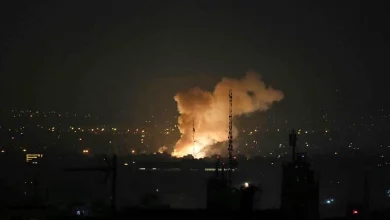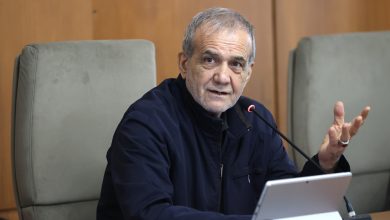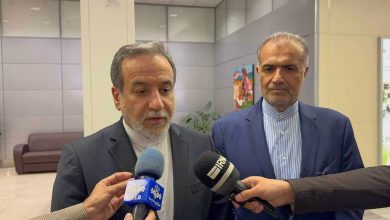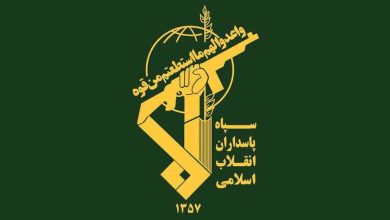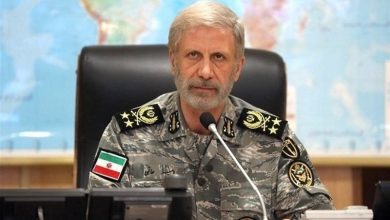US journalist says he was treated as an adversary by ‘israeli’ authorities during his detention in the West Bank
American journalist Jeremy Loffredo has reported that he was detained by Israeli authorities in the West Bank. According to Loffredo's account, he was held in solitary confinement and treated as if he were an adversary rather than as a journalist.
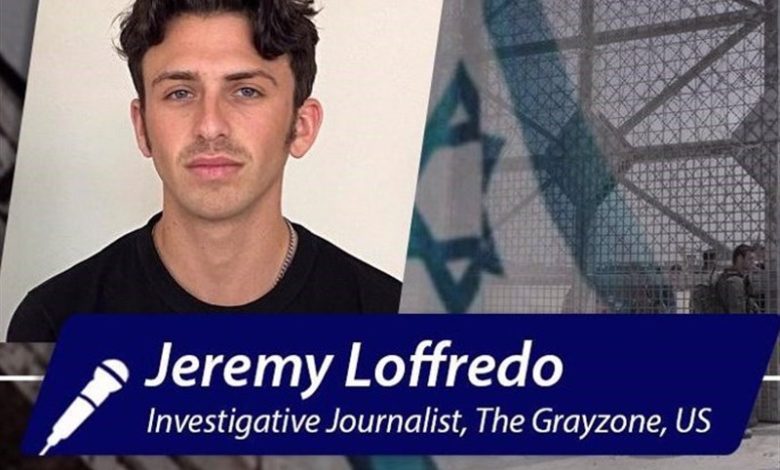
Loffredo, an investigative journalist with the Grayzone, shared his experiences in an interview with Press TV, marking his inaugural dialogue with Iranian media following his release.
In the wake of releasing a pivotal video documenting significant destruction at Israeli military facilities near Tel Aviv due to Iranian ballistic missile strikes, Loffredo was subjected to arbitrary detention.
Following several days in solitary confinement, authorities carried out an unofficial deportation of the individual to the United States.
Loffredo informed the Press TV website that the allegations leveled against him involve “supplying information to the enemy during wartime,” an offense that, upon conviction, could result in a minimum prison term of 25 years and potentially extend to a death sentence.
The unprecedented charges filed against an American journalist have incited a significant public uproar.
A journalist in police custody reported being treated as an adversary to the state, rather than a member of the press—a distinction seemingly irrelevant in Israel, he claimed. He described being held in solitary confinement for nearly four days, during which he was deprived of sufficient food and water, and had no sense of time.
Journalist Loffredo was among several reporters covering Iran’s retaliatory military operation on October 1st. However, his video report detailing the extent of the missile damage garnered considerable attention.
The specifics surrounding the attack and the extent of the damage incurred have not been disclosed by Israeli outlets or major Western media organizations.
Loffredo noted that the Israeli media’s failure to report on Iran’s retaliatory actions highlights a more profound concern: an “entrenched ideological patronage system” embedded within the Israeli regime.
An individual speaking with Press TV has claimed that investigative journalists in Israel often prioritize allegiance to the military over their journalistic duty to inform the public. According to the source, reports that might depict Israel as vulnerable are frequently suppressed or diminished in mainstream media coverage.
He stated that the reasons behind the Israeli authorities’ decision to target him are still “unclear.” However, it was noted that their intelligence services alleged his reporting for Grayzone featured “more precise details on missile impact locations compared to other media outlets.”
“This appears to have been an effort to permanently halt my work,” he asserted. “Israeli intelligence claimed my report provided more detailed information on missile impact sites compared to others. However, I suspect that my continued investigations were seen as a greater threat, prompting the authorities to specifically target me.”
In his evaluation of the impact inflicted by Iranian ballistic missiles, Loffredo reported that numerous missiles successfully penetrated Israeli air defense systems, hitting targets within Nevatim Airbase.
He stated that Nevatim Airbase, known for its role as a launch site for significant air operations in Gaza and, more recently, in Lebanon, remains a highly secured military area, inaccessible to outsiders and surrounded by extensive fencing in the Negev desert. Thus, his information is primarily based on eyewitness accounts.
Local sources reported that numerous missiles impacted the base, a claim supported by several videos that emerged on social media following the incident.
In a statement, Loffredo highlighted that the missile attacks in Tel Aviv, which have been largely overshadowed by the Nevatim incident, caused extensive damage, obliterating a substantial segment of a city block mere thousands of feet from the Mossad headquarters.
“According to reports, vehicles were completely obliterated and debris blanketed an area within a 200-foot radius. The missile impact left a crater approximately 50 feet wide that was swiftly filled in and concealed by Israeli authorities. This rapid response highlights the sensitivity and potential embarrassment for Israel, a nation known for frequently touting the effectiveness of its advanced, billion-dollar missile defense systems,” he explained.
Italian journalist Federico Loffredo was taken into custody just days following the rapid spread of his video report across social media platforms.
According to a statement provided to the Press TV website, the individual reported that on the afternoon of October 8th, shortly after the publication of their report on the Iranian missile strike, they were detained for a routine inspection near a military checkpoint outside Nablus in the northern West Bank.
Israeli military personnel at the checkpoint requested to see his passport and press identification.
The US journalist recounted a harrowing ordeal, stating that following multiple phone directives, they were instructed to cross the street. Upon doing so, individuals forcibly blindfolded them with approximately five meters of cloth, before shackling their legs and handcuffing their wrists. The journalist, along with their companions, was then escorted into the back of a military truck.
Following the arrests, all individuals were released except for one, against whom charges were exclusively pursued.
On October 20, Israeli authorities reportedly facilitated the informal deportation of the individual, as a formal deportation process would have necessitated a conviction on terror-related charges, which officials were unable to substantiate.
Law enforcement authorities have directed Loffredo to exit the occupied territories, leaving his case active as a “deterrent.” This measure ensures that should he attempt to return, he would be subject to renewed detention.
The limitations imposed on Israeli journalists concerning their online publications have not successfully curtailed the dissemination of sensitive information, as Israeli citizens continue to access international media sources. In response, Israel has intensified its measures, resorting to intimidation tactics such as the threat of violence, imprisonment, and even death to enforce its censorship policies, according to sources.
According to his statement, critical investigative journalists are facing an unprecedented challenge as the “courage threshold” has reached extraordinary levels. He emphasized that “reporting the truth now involves being prepared to risk imprisonment or even death.”
The impact is notable, potentially deterring journalists from publishing precise and critical information. Despite the challenges, I am dedicated to covering Israel’s activities. However, at present, I must conduct my reporting from locations outside of Israel and the West Bank.

